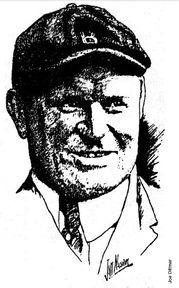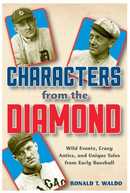May 8, 1909 - Wilkes-Barre Times Leader (Wilkes-Barre, PA)
ELBERFELD WILL BE SUSPENDED FOR ASSAULT
Yankee Third Baseman Will Draw Punishment for Attacking Umpire Hurst
New York, May 8. - The bit optic of conversation in sprints circles today is the fist fight between Tim Hurst, one of Ban Johnson’s indicator holders, and “Kid” Elberfeld, of the New York Americans, which took place at American League Park last night.
Elberfeld slid in the plate on a long fly and thought he was safe. Hurst said out. Elberfeld lost control of himself and began poking his finger against Hurst’s chest protector and handing out a long line of talk reflecting on the umpire’s eyesight. Hurst finally lost his temper and slapped Elberfeld in the jaw with the heel of his hand. Elberfeld started to draw his hand back to smash the umpire but walked away. The incident was closed in a second or two, but it is reported today the Elberfeld is to be suspended by the league officials.
If he draws a term for his action, it is reported today, charges will be preferred against Hurst. Stallings will not discuss the matter today, while Hurst declared that it was a subject he could not talk about.
ELBERFELD WILL BE SUSPENDED FOR ASSAULT
Yankee Third Baseman Will Draw Punishment for Attacking Umpire Hurst
New York, May 8. - The bit optic of conversation in sprints circles today is the fist fight between Tim Hurst, one of Ban Johnson’s indicator holders, and “Kid” Elberfeld, of the New York Americans, which took place at American League Park last night.
Elberfeld slid in the plate on a long fly and thought he was safe. Hurst said out. Elberfeld lost control of himself and began poking his finger against Hurst’s chest protector and handing out a long line of talk reflecting on the umpire’s eyesight. Hurst finally lost his temper and slapped Elberfeld in the jaw with the heel of his hand. Elberfeld started to draw his hand back to smash the umpire but walked away. The incident was closed in a second or two, but it is reported today the Elberfeld is to be suspended by the league officials.
If he draws a term for his action, it is reported today, charges will be preferred against Hurst. Stallings will not discuss the matter today, while Hurst declared that it was a subject he could not talk about.
Tim Hurst - Umpire Extraordinaire - Joe Dittmar

Arbitration on the ballfield around the turn of the century was a hazardous profession. There was no union, employment could be terminated at any time, and with little support from owners and league officials, .umpires faced raucous crowds and unbridled players who behaved with impunity. Afforded little respect or appreciation, the men in blue were routinely and publicly blamed for any subpar performance of a club or individual. Usually working alone, they were fed a staple diet of verbal abuse from throngs that sat within easy earshot, and often were targets of physical abuse as well. Rotten eggs, pop bottles, and seat cushions were common rebuttals to unfavorable decisions, and fist fights between umpires, players, and patrons were chronic. It didn't help that solo arbiters often worked entire home stands, lending credence to the adage that "familiarity breeds contempt."
The harrowing work left a shameful legacy of one year umpiring careers in the baseball encyclopedias. Between 1890 and 1909, when the NL employed no more than twenty full-time umpires at anyone time, forty-three individuals could bear the invective for one season or less. Many of these victims were former players who quickly learned that calling balls and strikes was akin to flirting with the coroner.
Marathon man
Tim often umpired in a cap with the letter "B" on it. When asked why, he replied, "It signifies I'm the best." He also officiated boxing matches, bike races, and marathons, although league president Ban Johnson frowned upon these. Once, while umpiring behind the plate in Philadelphia, Hurst needed to catch a train to referee a marathon in New York. In the ninth inning of that game, Kid Elberfeld scored what obviously appeared to be the tying run. But Hurst wanted the game to end, so he called the runner out at the plate. An argument followed in which Elberfeld pushed Hurst. Tim calmly picked up the catcher's discarded mask and drove it full force into Elberfeld's head, knocking him unconscious. He then calmly tossed the mask aside and walked off the field. The incident warranted a $100 fine and a one week suspension. Hurst, however, made $500 for refereeing the New York marathon and got to spend a week's vacation in his favorite city.
The harrowing work left a shameful legacy of one year umpiring careers in the baseball encyclopedias. Between 1890 and 1909, when the NL employed no more than twenty full-time umpires at anyone time, forty-three individuals could bear the invective for one season or less. Many of these victims were former players who quickly learned that calling balls and strikes was akin to flirting with the coroner.
Marathon man
Tim often umpired in a cap with the letter "B" on it. When asked why, he replied, "It signifies I'm the best." He also officiated boxing matches, bike races, and marathons, although league president Ban Johnson frowned upon these. Once, while umpiring behind the plate in Philadelphia, Hurst needed to catch a train to referee a marathon in New York. In the ninth inning of that game, Kid Elberfeld scored what obviously appeared to be the tying run. But Hurst wanted the game to end, so he called the runner out at the plate. An argument followed in which Elberfeld pushed Hurst. Tim calmly picked up the catcher's discarded mask and drove it full force into Elberfeld's head, knocking him unconscious. He then calmly tossed the mask aside and walked off the field. The incident warranted a $100 fine and a one week suspension. Hurst, however, made $500 for refereeing the New York marathon and got to spend a week's vacation in his favorite city.

Characters from the Diamond: Wild Events, Crazy Antics, and Unique Tales from Early Baseball - Ronald T. WaldoRowman & Littlefield, Mar 17, 2016 - 278 pages



